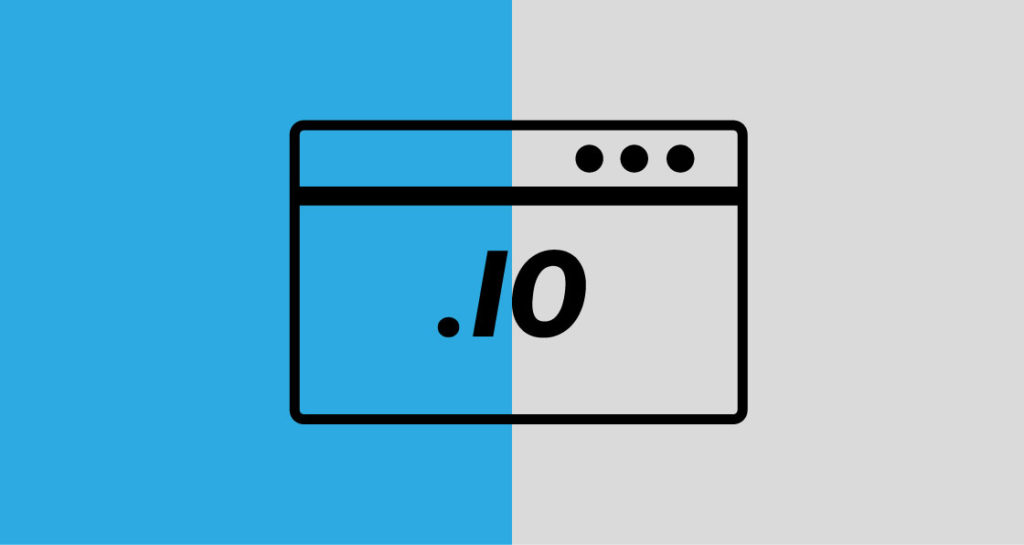When you’re launching a website, your new domain is one of the most important decisions you need to make. Your site’s name and web address can ultimately make or break your success. It’s going to impact your Internet presence and play a role in virtually every piece of marketing your brand puts out.
The domain itself holds the most value in terms of search engine optimization and branding. Nevertheless, the domain extension can impact public perception, which will have a domino effect on every other success factor out there!
The .com domain extension is the top-dog on the World Wide Web, ending nearly 150 million websites. It arguably shaped the Internet we know today and changed the digital revolution for the better! That said, it’s not your only choice.
Alternatives, such as the .io domain extension, are far more unique. Not only that, but they may better represent your site, opening up a world of possibilities in terms of marketability.
Not sure which domain is right for your website or blog? In this guide, we aim to compare and contrast the .io and .com domain extensions. We’re going to put these popular extensions in a head-to-head battle to understand what they have to offer and what they can bring to the digital table!
What is a Domain Extension?

First things first, let’s get acquainted with domain extensions and their purpose. Have you ever taken a moment to analyze a web address? If so, you’ll notice that every address is separated into distinct sections.
As an example, let’s take a look at this address: www.RandomSite.com. In this case, the “RandomSite” portion is the domain name. It’s the part that the website owner got to choose. This can be whatever you want, but in most cases, it’s your company name, blog title, or keywords that fit into your niche.
The domain extension for this example is “.com.”
Think of an extension as a suffix. Multiple websites can have the same domain name. But, they cannot share the same domain extension. The extension is the highest level of the hierarchal system known as the Domain Name System, or DNS for short. The DNS features several levels to categorize sites for easy navigation by browsers and Internet service providers.
Domain extensions are also called top-level domains, or TLDs. Without the right TLD, browsers may redirect users to completely different sites, such as www.RandomSite.org or www.RandomSite.net.
Currently, there are more than 1,500 TLDs. Some are restricted to specific applications. However, most are generic top-level domain, or gTLDs. Both .com and .io are gTLDs.
Why Does Choosing the Right Domain Extension Matter?
I know what you’re thinking, “What’s the point in worrying about the extension?” The extension might not seem like it holds much weight at face value. But that couldn’t be farther from the truth!
In addition to playing a part in your site’s overall brand, Internet users view specific extensions differently. This isn’t the early days of the Internet anymore! Most modern surfers are tech-savvy and know how to spot potential issues as they browse.
The World Wide Web is filled to the brim with nefarious sites that are hell-bent on defrauding visitors. Issues like identity theft, hacking, and spyware are a genuine threat that most people are well aware of. As a result, people view web addresses with a suspicious eye. Most don’t even realize it, but they have internal biases towards domain extensions they’re not familiar with.
The .com extension is considered a “legacy” domain extension. The same goes for .org, .gov, .edu, and more. These extensions have been around since before the World Wide Web was made available to the public. A vast majority of sites use them, building an inherent sense of credibility and safety. Web users have a general idea of what to expect from familiar extensions.
Of course, there are still plenty of unscrupulous sites that use legacy extensions, but most will gravitate to addresses that look familiar and appear to be safe.
Another critical thing to consider is what your domain extension says about your site. When the domain naming system first came to be, extensions were intended to represent a web page’s purpose. This made it easy for users to get a better idea of what to expect before they visit. For example, .biz stood for “business” while .net represented “network.” Even restricted extensions mean something. One good example is .gov, which is limited to government sites only.
A symbolic domain extension cuts right to the chase! It tells your visitors what they will encounter, which can help improve your site’s visibility a bit.
Does a Domain Extension Affect Visibility and SEO?
For the mentions we went over earlier, a domain extension absolutely impacts your site’s visibility. But, it doesn’t influence traffic in the way that you might think.
Contrary to popular belief, the domain extension doesn’t have a massive effect on search engine optimization. As long as you’re using a generic top-level domain, the address should have the same treatment from search engines as any other rankable site.
You see, popular search engines like Google have complex and mysterious algorithms to rank sites on results pages. Of the 200 or more factors that come into play, the domain extension is usually only one. Thus, the impact is very minimal.
However, the natural credibility that your domain extension has could influence your SEO endeavors in other ways. As we said earlier, more people are inclined to visit familiar “legacy” domains they recognize. Right off the bat, this will make your site more likely to experience organic traffic. When users see a long list of links after a search query, they’re going to stick with those .com, .org, and .gov links first.
One thing that ranking algorithms do favor is traffic. If you’re already getting decent traffic from your domain extension, you’re far more likely to rank higher up on results pages.
In this sense, your domain extension does impact SEO and visibility. But, it’s a secondary effect rather than a direct one.
About the .io Domain Extension

The .io domain extension is not as well-known as .com. However, it’s still quite prevalent. It grew massively in popularity during the last decade thanks to its strong association with technology.
In the tech and software industries, the letters “I/O” refer to input/output. Thanks to this connection, the extension has seen wide adoption among tech companies. More specifically, it’s a favorite among tech startups because it’s cheaper and more readily available than some of the alternatives.
Interestingly enough, the intention of .io wasn’t for technology at all. Instead, it started as a country-code top-level domain. A country-code top-level domain, or ccTLD for short, is specific to a country. There are 312 ccTLDs active today.
In the case of .io, this country code represents sites for the British Indian Ocean Territories. This small territory of the United Kingdom is an archipelago with over 1,000 small islands between Tanzania and Indonesia.
While initially reserved for sites about this territory, there are no rigid usage restrictions. Anyone can register a .io domain, which is why the tech community embraced the extension.
The .io extension was officially introduced in 1997. The first domain purchased was by Levi Strauss & Co. only a few months after it was established. Today, more than 270,000 sites have a registered .io domain.
Learn more about the io domain extension
About the .com Domain Extension

The .com domain is one of the oldest and most recognizable on the Internet! It was introduced back in 1985. The extension was a thing before the World Wide Web was!
Initially administered by the United States Department of Defense, the extension quickly became the go-to. Like other “legacy” extensions, .com had a particular purpose. The three-letter extension initially stood for “commercial.” As a result, it was frequently used by for-profit websites and eCommerce platforms. Of course, there weren’t any enforced restrictions for usage, so the domain’s adoption quickly spread.
There’s still some debate as to why .com became the “default” for websites. But most historians contribute its popularity to the dot-com bubble. When investors and businesses realized that the Internet was ripe with money-making opportunities, the commercial-focused extension was a natural choice.
Today, .com domain extensions are ubiquitous. Larger companies shell out millions of dollars to obtain a domain with this extension. To put things into perspective, all of the most expensive domain names ever sold used .com. The easy-to-remember domain “business.com” reportedly sold for about $345 million!
Verisign currently manages the extension. According to the Domain Name Industry Brief, about 145.4 million websites use this domain as of March 2020. That’s a far cry from the quarter-million of .io!
How to Buy Your .io or .com Domain Name
No matter which domain extension you choose, the first step is to see what’s available. For most, this is going to be the final deciding factor!
Domains are available at dedicated registrars and web hosting companies. Oftentimes, web hosting providers act as a domain registrar to purchase the domain on your behalf and complete proper registration steps. Some will even provide a free domain to get you started! Though, it might not always have a .com or .net extension.
Visit a hosting service or domain registrar, such as Bluehost. Then, perform a simple domain search to see what’s available.
There’s two great choices to buy your .io or .com domain name.
#1 – Bluehost.com – You can get a domain name for free when you buy a hosting plan. Prices start from $2.95 p/m
#2 – Domain.com – Use coupon code SITEHUB and get 25% off your domain.
You can type in your desired keywords or website name. In most cases, the registrar will present available extensions. If the .io and .com extensions are up for grabs, they’re usually at the top of the list!
The cool thing about domain registrars is that you will see options even if the extensions aren’t available. You can make changes to your domain name or choose one of the open options. After some simple registration steps and payment, the domain name is all yours! Connect it to your hosted website, and your visitors can start seeing your site!
Domain names have to be renewed every year. Unless you purchase multi-year plans ahead of time, don’t forget to renew your registration! Otherwise, you’ll lose the domain. With the popularity of .net and .com extensions, staying on top of registration dates is crucial!
Perks of Choosing a .io Domain Name
.io might be a dwarf compared to the juggernaut that is .com. However, don’t count it out just yet! There are plenty of reasons to utilize this recognizable and unique domain extension. Here are only a few!
Connection to Technology
If you have a tech-based website or company, this domain extension is a no-brainer. It’s already a favorite among software developers, SaaS providers, tech startups, and more. The strong association with technology is well-known within the computer science network.
As a result, the marketing is already done for you! Your target audience will likely know the importance of I/O, making your site stand out to those that matter.
Uniqueness
When compared to traditional domains, .io is unique enough to stand on its own. The extension can become an integral part of your marketing campaign and set your site apart from the crowd.
Furthermore, the two-letter extension is excellent for creating shorter URL links. Thus, it’s easy to remember and stands out in the mind of visitors. There are plenty of generic and new TLDs out there to choose. But, there’s something about this clean and simple extension that just sticks out!
Domain Hacking
Want to get creative with your web address or company name? If you’re not familiar with the domain hacks, it’s a lot more innocent than the title would lead you to believe!
This quirky naming technique involves using the domain name and the extension to create memorable words or phrases. It’s a great way to attract attention right off the bat. Many companies use it to come up with a brand-new name that coincides with their digital address.
A domain ending in .io has a world of possibilities! Some good examples include Portfol.IO, Rub.IO, or Adag.IO.
Availability
The last notable benefit of registering a .io domain is the wide availability. This extension is not as widespread as .com or other traditional domains. While it has some prevalence in the tech community, most website owners don’t even know it exists!
As a result, you shouldn’t have a problem finding your domain name. Plus, pricing is generally pretty affordable.
Potential Problems
The only potential downside you might encounter is familiarity. Do a quick search about this domain, and you’ll see that many people question the extension’s legitimacy and safety.
If you’re not trying to attract tech-savvy people who already know what I/O stands for, some may avoid your sight because it’s too unorthodox!
Perks of Choosing a .com Domain Name
As the single most-popular extension on the web, there’s a lot to gain from having a .com domain! But is it right for you? Here are some perks to consider.
Built-In Credibility
There’s no denying that people are more comfortable visiting a .com website than other generic TLDs. In fact, you’d be hard-pressed to find a user who gives it a second thought unless there’s a strange domain attached!
This ingrained familiarity can work in your favor. Your site will already appear to be credible before anyone visits it. This alone can do wonders for your visibility and SEO efforts.
Mobile-Friendly
Did you know that many smartphones and tablets have dedicated “.com” keys? Usually, it only appears when a user is trying to navigate the browser. It’s a simple feature that can speed up the overall user experience.
You can tap into that convenience without having to do a thing. Pair the extension with a memorable domain, and your visitors can stop by your site with only a few finger taps!
SEO-Ready
Many content marketers say that having a .com extension is the first step in seeing any real SEO success. As mentioned earlier, search engines don’t view the extension any more favorably than other generic TLDs. But, they can help you grow traffic organically, which does factor in your ranking.
This extension is one of the best for growing traffic without any significant optimization efforts. With some existing traffic coming in, you might see better results after deciding to optimize your site.
Potential Problems
A .com extension has a lot to offer regardless of the type of website you’re running. But, those perks only apply if you can get your hands on a domain in the first place.
The popularity of the extension can make it hard to register your first-choice domain. During the dot-com bubble, this TLD was the victim of domain parking. People would snatch domains for popular keywords and sit on them until someone is ready to buy. Then, they’d charge way more to resell it. Remember the business.com sale we went over earlier?
Be prepared to shell out some cash or go back to the drawing board for domain names. This extension can be a worthy investment that serves your site well for years to come. However, finding an available domain to register is half the battle in many cases.
.io vs .com: Which Domain Extension is Best?
These two domain names are heavy-hitters online. The right choice for you will depend entirely on your needs and website. If you have a tech startup or even a blog that centers around modern technology, the .io domain extension may be for you! It has a natural connection to computer science and can attract all the right attention.
Meanwhile, the .com domain is an excellent universal option for any website. There’s no denying that the .com domain holds a lot of weight in the eyes of Internet users. It attracts organic traffic and may make your site look more credible.
Both .io and .com have their advantages and disadvantages. Whatever you choose, your content is going to be the most important thing to focus on. A domain name is only as good as the website it’s attached to!
Want to read some more domain comparisons?
Well you may as well check out our guides on these domain comparisons!
What does .io mean?
The domain extension “.io” is used by people or organizations for various purposes, such as startups in the technology industry.
This extension belongs to the British Indian Ocean Territory, which is a territory of the United Kingdom located in the Indian Ocean.
The popularity of the “io” extension is due to its abbreviation for “input/output” and its association with the tech industry.
Jamie Spencer
Latest posts by Jamie Spencer (see all)
- 50+ Ways To Advertise Your Business For Free On The Internet – 2024 Guide - April 5, 2024
- How to Start Your Own Podcast - April 2, 2024
- Uber Stats 2024 – All The Numbers & All The Facts - April 2, 2024
